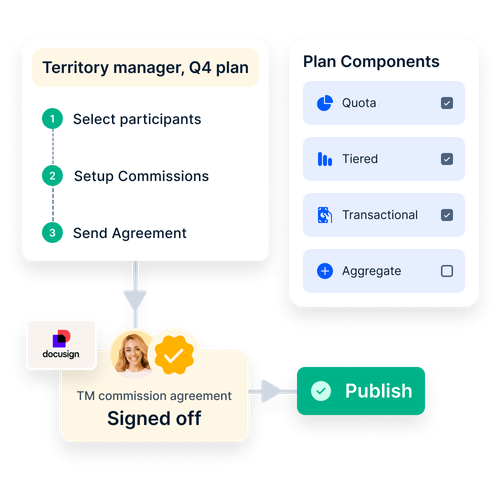En esta página
A comparison driven study
Commissions and bonuses are two of the most common types of compensation that a business pays to incentivize revenue generation behavior amongst sales channels and teams.
Both act as proven means for the organizational leadership to maximize revenue and commercial productivity while keeping key teams and workers motivated. A bonus is a complex, layered reward that is given out during fixed times in a year, while a commission is a straightforward, ongoing reward for each sale made.
We capture the salient points and significant differences to help you make an informed judgment about what fits your teams best.
Commission VS Bonus
What’s the difference, really?
If commissions are the currency of the Wild Wild West of salesland ruled by lone wolves and sharks on the hunt for big bucks fast, bonuses are ‘family gestures’ prevalent in more stable organizational environments. Commissions can be cold and rational, while bonuses tend to be heartwarming and personal.
A commission is a digital (binary) and neutral concept nicely capturing the African saying, “If you want to go quick, go alone.” A bonus is an analog and emotional idea reflecting the old proverb, “If you want to go far, go together.”
We list out the major differences between a commission and a bonus below.
Commission: An acknowledgement of results– No More, No Less.
A commission is a purely transactional arrangement that is directly and entirely linked to the sale. The individualistic spirit driving a commission-based relationship is similar to that of a freelancer in a gig economy.
Commission driven individuals essentially operate in mercenary mode: Unencumbered by protocols, they choose their preferred mode, method and time to complete the job.
The plug-and-play nature of a commission-based sales compensation format allows professionals greater control over their work-life balance: Make ‘a killing’ today, for instance, and take the rest of the week or month off.
This is a clinical arrangement that may feature minimal levels of emotional attachment and ties with the commissioning company or product; It is not uncommon for individuals in a commission-based compensation structure to simultaneously work for multiple organizations.
With potential for earning uncertain but unlimited, the commission format suits and rewards high performance, self-driven ‘super performers’.

Bono
A recognition beyond results - saluting alignment and involvement
Unlike a commission, a bonus is usually not directly and entirely linked to one specific transaction or sale. It is a multidimensional, long-term concept with ‘human’ layers that add meaning and richness to incentivization.
Perhaps the biggest difference is that while commissions have clearly defined terms, bonuses carry an element of management discretion.
A commission is legally binding upon the company and is earned fair and square. A bonus, however, is an additional act of acknowledgment on top of a sale. It comes with a strong ‘pat on the back’ flavor, recognizing overall involvement and continued loyalty - not just one-off performance. Bonuses make employees feel more included and part of the organization’s journey.
A bonus is typically calculated on both organizational and individual performance parameters. It makes room to accommodate not only strengths, but shortcomings too. While it is designed to celebrate triumph, a bonus is also a promise of support and solidarity during tough times.
A bonus may be infrequent or sometimes may not happen at all. When it does though, it arrives as a pleasant surprise and gives the employer-employee relationship a discernible lift.
Commission and bonus: capturing the contrast
A difference in philosophy
Bono
- Alignment to purpose
- Advances entire teams
- Calculation may be complex
- Control in management’s hands
- Fixed but may be ad-hoc
- May generate misunderstanding & dissatisfaction
- May stress company coffers
Commission
- Aligned to transaction
- Good for solo performers
- Clearly & precisely quantifiable
- Control in individual’s hands
- Variable but guaranteed
- No scope of misunderstanding & grievance
- Doesn’t pressurize company coffers
Types of bonuses
- Performance based bonus: Awarded basis sustained performance.
- Volume based bonus: Awarded basis total quantity of successful sales conversions made in a specific period of time.
- Quota based bonus: Awarded when a specific target or slab is reached
- Profit sharing bonus: Awarded as a calculation on net profit generated during a specified period of time.
- Gain sharing bonus: Awarded as a calculation on predefined baseline performance outcomes.
- Spot or spiff (Sales Performance Incentive Fund) Bonus: Awarded as a one-off reward for specific actions.
- Task or milestone bonus: Awarded after a task is completed or a milestone is crossed.
- Project bonus: Awarded on a project-to-project format.
- Annual bonus: Awarded at the end of the year as a function of both company’s and individual’s performance (similarly for quarterly and half yearly bonus).
- Sign-on bonus: Awarded at the time of onboarding or joining as an acknowledgment of the individual’s preference for the company over rivals and competitors.
- Retention bonus: Awarded as an acknowledgement of the individual’s loyalty and to ensure they remain in the company; Helps attract top talent.
- Attendance bonus: Awarded for ‘showing up’ on the job punctually and consistently.
- Referral bonus: Awarded for referring a valuable resource to the company.
- Holiday bonus: Awarded to honor the worker’s need for work-life balance, encouraging a quick break.
Types of commissions
- 100% commission: A compensation structure based entirely on commissions without a base salary component.
- Base + percentage commission: A more stable compensation mode combining both fixed component and variable incentive.
- Tier based commission: Once they cross a target or quota, performers are ‘promoted’ to the next slab or tier featuring higher commission rates – an example of a sales accelerator.
- Revenue based commission: A commission based on gross that is paid against total sales done – usually a transparent and simple calculation.
- Profit based commission: A commission based on net that is awarded on profit generated - good for high margin products
- Residual commission: A commission related to long term contracts and accounts paid on past sales that continue to generate revenue.
- Territory volume commission: A commission promoting team spirit where earnings are based on total sales volume in a certain territory.
- Flat rate commission: A fixed, pre-determined amount of commission paid for every sale closed.
- Multiplier commission: A customizable commission where a base amount is further modified and multiplied by performance-based factors.
- Base rate commission: A commission featuring a fixed quantity – resembling a salary or hourly rate – and no additional incentives. Good for consultancy and support functions.
Bonus or commission?
Which one should you go for?
If you want to lay robust, long-term foundations for a motivated and high-performance sales and revenue generation department, go for a bonus-based compensation structure.




